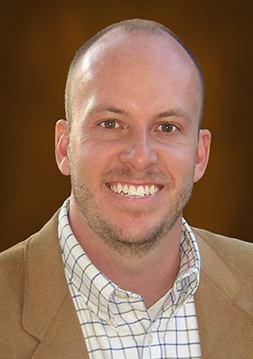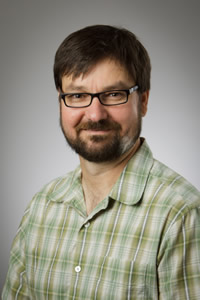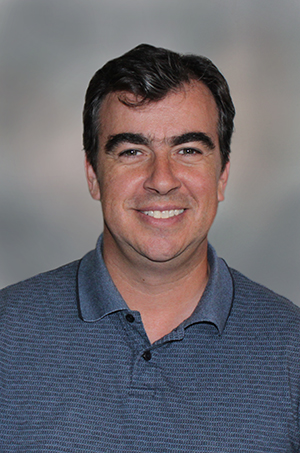A&S Faculty News
January 2017
Cunningham on Firing Sally Yates
 Sean Cunningham, Chair of the Department of History, has been quoted Jan. 31 in mainstream
news outlets such as USA Today, CNBC, Newsmax, and Yahoo.com regarding President Donald Trump's firing of Attorney General Sally Yates for refusing
to enforce his immigration policy. Some Trump critics compared the Yates firing to
the so-called "Saturday Night Massacre," when in 1973 then-President Richard Nixon
fell out with the Attorney General's Office—an event that ended with the resignations
of the attorney general and deputy attorney general. Cunningham's take on the comparison:
"Clashes between presidents and attorney generals aren't unprecedented, but neither
are they common," he told USA Today. Cunningham did not compare Yates' firing to the
"Saturday Night Massacre," the story reported, but he did say that "One of the important
takeaways is that Nixon's efforts to control the attorney general and control the
Watergate narrative, backfired badly."
Sean Cunningham, Chair of the Department of History, has been quoted Jan. 31 in mainstream
news outlets such as USA Today, CNBC, Newsmax, and Yahoo.com regarding President Donald Trump's firing of Attorney General Sally Yates for refusing
to enforce his immigration policy. Some Trump critics compared the Yates firing to
the so-called "Saturday Night Massacre," when in 1973 then-President Richard Nixon
fell out with the Attorney General's Office—an event that ended with the resignations
of the attorney general and deputy attorney general. Cunningham's take on the comparison:
"Clashes between presidents and attorney generals aren't unprecedented, but neither
are they common," he told USA Today. Cunningham did not compare Yates' firing to the
"Saturday Night Massacre," the story reported, but he did say that "One of the important
takeaways is that Nixon's efforts to control the attorney general and control the
Watergate narrative, backfired badly."
Sievert Weighs in on Voter Fraud
Joel Sievert, a Visiting Faculty member in the Department of Political Science, was quoted in a FOX-34 news item about President Trump's call to investigate voter fraud. The Jan. 25 story said that some people think the investigation might be used to expand voter identification laws. "One would imagine that the line of attack the administration is likely to follow is the way we're going to get around voter fraud is that we need stricter laws," Sievert was quoted as saying. Sievert will join the Department of Political Science as an Assistant Professor in Fall 2017.
Ramkumar on India's Cotton Market
Seshadri Ramkumar, Professor in the Department of Environmental Toxicology/The Institute for Environmental & Human Health, wrote an article about India's cotton crop that was published Jan. 24 in Cotton Grower and Jan. 25 in Cotton Association of India. In the report, "Indian Cotton Crop Estimated at 34.1 Million Bales," Ramkumar compares the estimated crop for the October 2016-September 2017 season with the previous year and evaluates the factors—such as mill consumption and supply delivery times—that may cause price volatility.
Perkins Finds Speech Non-Partisan
Jared Perkins, Visiting Professor in the Department of Political Science, was quoted in a Jan. 20 FOX-34 news segment about Donald Trump's inauguration speech. Perkins was quoted as saying that Trump's speech was non-partisan in many ways, reflecting the president's approach to his campaign. "He was really speaking to the Americans that invested a lot of their hope in him, and voted for him, and really felt left out of the political process," Perkins told the Lubbock television station. "The first few minutes were really targeted towards politicians, and elites on both sides of the aisle who he says haven't been doing anything for the American people."
Forbis on Pick for Energy Secretary
Robert Forbis, an Assistant Professor in the Department of Political Science, was quoted in a Jan. 19 FOX-34 news story about former Texas Governor Rick Perry, now in his confirmation hearing as President Trump's nomination for secretary of energy. Forbis was quoted in the story as saying that Perry would have to work with scientists to address climate change and the burning of fossil fuels. In the past, Perry was skeptical about human activity's influence on climate change, a position the former governor has since changed. "You do not address climate change without addressing energy policy," Forbis told FOX-34. "The two go hand in hand. And in terms of Governor Perry's remarks today and in the past, those of us who do this research are a bit concerned."
Martin Tapped for EPA Advisor
Clyde Martin, a Horn Professor emeritus in the Department of Mathematics & Statistics, has been selected as a member of the Science Advisory Board for the U.S. Environmental Protection Agency (EPA), as reported Jan. 19 in Texas Tech Today. He will serve as a special government employee and provide independent expert advice on technical issues underlying EPA policies and decision making. Martin's background includes applying stochastic modeling to environmental problems, in particular to the problem of climate change.
Tang Quoted on Smoking Cessation
 Yi-Yuan Tang, Professor in the Department of Psychology and Director of the Texas
Tech Neuroimaging Institute, was one of 10 experts consulted for WalletHub's Jan.
17 article, "The Real Cost of Smoking by State." The story showed the costs of smoking over an individual smoker's lifetime and over
a year, state-by-state. Total costs per smoker took into account factors such as out-of-pocket
expenditures, health-care costs, income loss, and higher insurance rates. Lifetime
total costs per smoker ranged from the low of $1.1 million for Kentucky residents
to the high of $2.3 million for New York State residents. Tang was quoted as saying
that the most effective strategies to quit smoking rely on brain-based treatments
that target self-control combined with intention to quit. "If smokers only rely on
intention or motivation, it often fails," he told WalletHub. Tang is known for his
research on mindful meditation to quit smoking. The article also prompted Tang to
weigh in on e-cigarettes and the legalization of marijuana: "Since e-cigarettes have
nicotine, the same chemical that induces craving and addiction with cigarettes, in
principle they should the treated as cigarettes." And, "Although several surveys and
studies have suggested that marijuana legalization leads to increased use of marijuana,
while tobacco use decreases in some degree, more rigorous research is warranted."
Yi-Yuan Tang, Professor in the Department of Psychology and Director of the Texas
Tech Neuroimaging Institute, was one of 10 experts consulted for WalletHub's Jan.
17 article, "The Real Cost of Smoking by State." The story showed the costs of smoking over an individual smoker's lifetime and over
a year, state-by-state. Total costs per smoker took into account factors such as out-of-pocket
expenditures, health-care costs, income loss, and higher insurance rates. Lifetime
total costs per smoker ranged from the low of $1.1 million for Kentucky residents
to the high of $2.3 million for New York State residents. Tang was quoted as saying
that the most effective strategies to quit smoking rely on brain-based treatments
that target self-control combined with intention to quit. "If smokers only rely on
intention or motivation, it often fails," he told WalletHub. Tang is known for his
research on mindful meditation to quit smoking. The article also prompted Tang to
weigh in on e-cigarettes and the legalization of marijuana: "Since e-cigarettes have
nicotine, the same chemical that induces craving and addiction with cigarettes, in
principle they should the treated as cigarettes." And, "Although several surveys and
studies have suggested that marijuana legalization leads to increased use of marijuana,
while tobacco use decreases in some degree, more rigorous research is warranted."
Hayhoe Blog in Long Beach Paper
Katharine Hayhoe, Associate Professor in the Department of Political Science and Director of TTU's Climate Science Center, was featured in the Jan. 6 edition of the Long Beach College Viking for her video blog called Global Weirding, produced in conjunction with KTTZ-TV.
Sweet Leads Trip to San Salvador
 Dustin Sweet, Assistant Professor of Geology in the Department of Geosciences, leads
a field trip to San Salvador, where graduate students study carbonate sediments, better
known as limestone. Sweet's most recent trip was the subject of a Jan. 6 story in
Texas Tech Today: "San Salvador Helps Geologists Connect the Past with the Present."
Sweet is quoted in the story as saying that he hopes students learn by getting to
"take modern carbonate sediment and run it through their fingers, look at the different
constituents—there's a snail, there's a clam and there's all this fine-grain sediment—and
picture that mass of sediment in their hand being turned into a rock." Sweet explained
that carbonate sediments are most commonly created directly from sea shells or are
created as a result of erosion caused by fish chomping on corals. Other types of sediments
are inorganic and created through physical or chemical erosion that find their way
out into the ocean. Living creatures adapt to changing conditions in ways that inorganic
sediments cannot, Sweet told Texas Tech Today, so carbonate sediments—and the rocks
they form into—can tell geologists about the environment at the time they were created.
Dustin Sweet, Assistant Professor of Geology in the Department of Geosciences, leads
a field trip to San Salvador, where graduate students study carbonate sediments, better
known as limestone. Sweet's most recent trip was the subject of a Jan. 6 story in
Texas Tech Today: "San Salvador Helps Geologists Connect the Past with the Present."
Sweet is quoted in the story as saying that he hopes students learn by getting to
"take modern carbonate sediment and run it through their fingers, look at the different
constituents—there's a snail, there's a clam and there's all this fine-grain sediment—and
picture that mass of sediment in their hand being turned into a rock." Sweet explained
that carbonate sediments are most commonly created directly from sea shells or are
created as a result of erosion caused by fish chomping on corals. Other types of sediments
are inorganic and created through physical or chemical erosion that find their way
out into the ocean. Living creatures adapt to changing conditions in ways that inorganic
sediments cannot, Sweet told Texas Tech Today, so carbonate sediments—and the rocks
they form into—can tell geologists about the environment at the time they were created.
Noel Talks Gas Prices on Local TV
 Michael Noel, associate professor in the Department of Economics, was consulted for
a FOX-34 story, "Gas Prices Continue to Rise," broadcast Jan. 2. "Right now, OPEC is getting together some non-OPEC countries and
they've agreed to cut [oil] production by a good two percent of world production,"
Noel told the Lubbock TV station. As a result, "It's possible you could see prices
jump, to between $2.50 and $3 a gallon," Noel said. "Keep in mind now with the technology
that we have in the oil wells and the Permian Basin, Midland, North Dakota, there
is a natural break on gasoline prices now. Once they get to $60, $70, $80 production,
the U.S. starts pumping right up and slows down any increasing prices after that,"
Noel said, adding that the United States consumes less gasoline now than it did 20
years ago, and that Europe consumes less than it did 50 years ago. Now, demand from
other parts of the world—China, India, South East Asia—has a large effect on crude
prices," Noel explained.
Michael Noel, associate professor in the Department of Economics, was consulted for
a FOX-34 story, "Gas Prices Continue to Rise," broadcast Jan. 2. "Right now, OPEC is getting together some non-OPEC countries and
they've agreed to cut [oil] production by a good two percent of world production,"
Noel told the Lubbock TV station. As a result, "It's possible you could see prices
jump, to between $2.50 and $3 a gallon," Noel said. "Keep in mind now with the technology
that we have in the oil wells and the Permian Basin, Midland, North Dakota, there
is a natural break on gasoline prices now. Once they get to $60, $70, $80 production,
the U.S. starts pumping right up and slows down any increasing prices after that,"
Noel said, adding that the United States consumes less gasoline now than it did 20
years ago, and that Europe consumes less than it did 50 years ago. Now, demand from
other parts of the world—China, India, South East Asia—has a large effect on crude
prices," Noel explained.
College of Arts & Sciences
-
Address
Texas Tech University, Box 41034, Lubbock, TX 79409-1034 -
Phone
806.742.3831 -
Email
arts-and-sciences@ttu.edu
